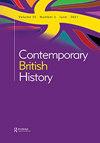‘Mandela’s out so apartheid has finished’: the British Anti-Apartheid Movement and South Africa’s transition to majority rule, 1990-1994
IF 0.5
2区 历史学
Q1 HISTORY
引用次数: 0
Abstract
ABSTRACT Based on original archival research and oral history interviews, this article examines how the British Anti-Apartheid Movement (AAM) adapted to the evolving circumstances during South Africa’s transition from apartheid to democracy between 1990 and 1994. It argues that the successful framing and impact of the Free Nelson Mandela Campaign (FNMC) of the 1980s, inadvertently created a series of challenges for the AAM in the years after Mandela’s release from prison in February 1990, as many in Britain came to associate this moment with the end of apartheid. The pervasive sense that apartheid was over, coupled with the complexity, uncertainty and violence of South Africa’s political transition, created a difficult campaigning environment for the AAM, who found it hard to maintain the momentum generated through the FNMC. Despite encountering numerous (trans)national and local challenges which inhibited its impact after 1990, this article concludes that the AAM’s persistent campaigning presence allowed it to capitalise following renewed British interest in South Africa following the announcement in June 1993 of a date for the first non-racial democratic election. This enabled the AAM to make a tangible contribution, primarily through fundraising, to the African National Congress’ successful election victory in May 1994.“曼德拉下台了,种族隔离已经结束”:英国反种族隔离运动和南非向多数统治的过渡,1990-1994
摘要本文基于原始档案研究和口述历史访谈,考察了1990年至1994年南非从种族隔离向民主过渡期间,英国反种族隔离运动如何适应不断演变的环境。它认为,20世纪80年代自由纳尔逊·曼德拉运动(FNMC)的成功框架和影响,在1990年2月曼德拉出狱后的几年里,无意中给AAM带来了一系列挑战,因为许多英国人开始将这一时刻与种族隔离的结束联系在一起。种族隔离已经结束的普遍感觉,加上南非政治过渡的复杂性、不确定性和暴力,给AAM创造了一个艰难的竞选环境,他们发现很难保持通过民族解放阵线产生的势头。尽管在1990年后遇到了许多(跨)国家和地方挑战,这些挑战抑制了AAM的影响力,但本文得出结论,在1993年6月宣布第一次非种族民主选举日期后,AAM持续的竞选活动使其得以利用英国对南非的新兴趣。这使AAM能够主要通过筹款为1994年5月非洲人国民大会的选举胜利做出切实贡献。
本文章由计算机程序翻译,如有差异,请以英文原文为准。
求助全文
约1分钟内获得全文
求助全文
来源期刊

Contemporary British History
HISTORY-
CiteScore
1.40
自引率
14.30%
发文量
34
期刊介绍:
Contemporary British History offers innovative new research on any aspect of British history - foreign, Commonwealth, political, social, cultural or economic - dealing with the period since the First World War. The editors welcome work which involves cross-disciplinary insights, as the journal seeks to reflect the work of all those interested in the recent past in Britain, whatever their subject specialism. Work which places contemporary Britain within a comparative (whether historical or international) context is also encouraged. In addition to articles, the journal regularly features interviews and profiles, archive reports, and a substantial review section.
 求助内容:
求助内容: 应助结果提醒方式:
应助结果提醒方式:


